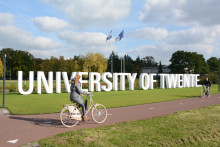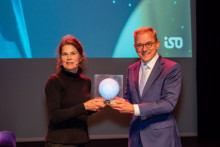First: what is Shaping2030?
Shaping2030 is the University of Twente's mission, vision and strategy for 2020-2030. Essentially it is a document containing information on what the UT plans to do in order to contribute to ‘a fair, sustainable and digital’ society in the coming nine years. Although some of its goals are rather abstract – such as having ‘Challenges as guiding principles’ – the strategy also includes specific targets, such as implementing sustainable solutions on our campus use, thereby reducing carbon footprint with at least 15% by 2023. The mission document was written out in 2019 based on input from about 600 people across the entire UT.
(The full Shaping2030 document is here. For a short overview, this infographic might help.)
It’s 2021 now. Is the strategy already being implemented?
Yes, but not very visibly or noticeably. 2020 was the first year of implementation of the strategy, but because it originated from the organization, it’s not completely new. ‘Faculties, institutes and departments were already working on a lot of initiatives. One of the first steps was to conduct an inventory of all existing initiatives and plans related to Shaping2030,’ explains Mascha Weijers, Communication advisor on the Shaping2030 coordination team. ‘We came up with approximately 230 existing initiatives and we wanted to better categorize them into themes. Which is how we came up with the idea of expert groups.’
What are these Shaping2030 expert groups?
There are six expert groups, each focused on a different theme: Innovation of Education, (Citizen) Science, Individuals and Teams, Digitalization, Inclusion and Sustainability. ‘The groups exist in order to give a boost to developing initiatives and bind people to them,’ says the programme manager Inge Boomkamp. ‘A lot is happening already at the UT, and so the groups’ first task is to make an inventory of all the existing activities and see how they match the Shaping2030 goals. The goal of the expert groups isn’t to necessarily run new initiatives. They exist to give activities a boost and to collect good practices across the university.’
Who is working on reaching the Shaping2030 goals?
With about 230 existing initiatives, supposedly a lot of UT students and employees. ‘The driving force behind making sure that the strategy is implemented are UT faculties themselves,’ says Boomkamp. ‘The strategy was co-designed with all faculties and departments, and so it should align with their own goals. Based on that, we give the faculties the responsibility and the trust to implement the strategy.’
Does the mission impact our daily lives, as UT employees and students?
Yes and no. Even though the coordination team would like every member of the UT community to contribute, you don’t necessarily need to do anything ‘extra’. Faculty boards and the Executive Board will have so called Shaping dialogues to discuss how the faculties contribute to Shaping2030 and how the Board can support them in realizing their goals. ‘We also think such dialogues should be held at other levels of the university – within departments and even individual employees,’ says Weijers. ‘It’s important that people talk about it at every level and know how they do or could contribute. The strategy has many goals and not all of us should be working on all of them. For example, we should not all be working on the tiny houses project. We should each focus on topics that relate to our daily work. We want to align Shaping with our daily way of working. We start with the person, with what they do, what motivates them. Based on that, we see which Shaping goals are already in their work.’
Basically, if you are working on anything useful and people-first, chances are that it is covered in the UT’s vision and there is no need to change your ways.








